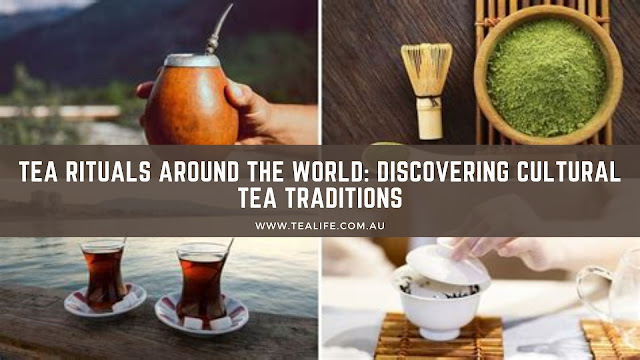Tea Rituals Around the World: Discovering Cultural Tea Traditions
In many cultures throughout the world, tea is more than just a beverage; it's a highly significant cultural object. In both official and informal contexts, tea is vital for maintaining conventions and building connections. Let's look at the various tea ceremonies that are practised across the world and the intricate web of customs surrounding this widely consumed beverage.
The Australian Tea Culture
The Tradition of Tea in Australia reflects many cultural influences that have shaped the nation, blending tradition with a contemporary touch. Australians like their tea in a laid-back manner, whether it's for a warm cup in the morning or a pick-me-up in the afternoon. Australians are becoming more and more interested in specialised teas and unusual blends, and they value the skill of creating the ideal cup of tea to suit their palates. In Australia's developing tea culture, every sip from traditional black teas to herbal infusions is a moment to be cherished.
Japan: The Tranquillity of Chanoyu
In Japan, tea is more than simply a beverage—it's a spiritual practice known as Chanoyu or the Way of Tea. This ancient tradition emphasises mindfulness, peace, and respect above everything else. The serene tea chamber, featuring tatami mats and basic furnishings, provides the setting for the tea ceremony. A creamy drink is made by combining matcha, a powdered green tea, with wagashi, which are delicate pastries. The precise pouring of hot water and the careful handling of tea bags equipment are only two examples of the choreographed dance that embodies the beauty of simplicity and serenity in the tea ceremony.
Morocco: The Warmth of Maghrebi Mint Tea
In Morocco, tea is a symbol of hospitality and friendship. Moroccan mint tea, also known as Maghrebi mint tea, is a delicious beverage that is traditionally made with green tea, sugar, boiling water, and fresh mint leaves. Tea is brewed in a special teapot called a "teyan," which has an angled spout that allows you to pour tea to create froth. Tea is poured into little cups from above to enhance flavour and facilitate aeration. At social gatherings, it is usually offered savoury food or sweet treats, symbolising warmth and benevolence.
India: The Timeless Tradition of Chai
In India, chai is not just a drink but also a cultural institution. "Chaiwalas," or street vendors who specialise in making chai, are a common sight across the country. To prepare chai, black tea leaves are traditionally boiled with milk, sugar, and spices including cardamom, ginger, and cinnamon. The result is a warm, flavorful, and aromatic brew that pairs nicely with lively conversations and special events. Chai is occasionally served in miniature glasses or clay mugs to add to its rustic look.
Inference
Tea traditions around the globe are a reflection of the cultural identities and values of many nations, ranging from the ornate ceremonies of Australia, China, and Japan to the gracious hospitality of Morocco and the daily delight of chai in India. In order to honour this variety, we at Tea Life provide a carefully chosen assortment of fine teas, such as unique blends like Soursop tea and practical choices like tea bags. Let Tea Life be your guide on a tea exploration adventure, whether you're looking for a quiet time or something to do with your loved ones. Join us in celebrating the joy, beauty, and tradition of tea.


.jpg)
Comments
Post a Comment